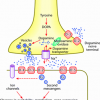Is there anything else in its favor?
Plus like mentioned before… even if the paleo-diet is healthier, it will never gain worldwide prominence because a meat-based diet is flat-out unsustainable for 7 plus billion people.
How is this relevant?
I'm asking for the healthiest diet for me, not the diet I should impose on the entire world once I'm king.
Additionally, as I've specified earlier, there's a significant difference between:
"Paleo isn't the healthiest diet"
and
"Paleo is the healthiest diet, but shouldn't be pursued because..."
I'd like to keep this distinction clear.
But thank you for your input on vegan re saturated fat... perhaps one of the paleo folks will respond?
Edited by ancap_2, 06 October 2013 - 12:57 PM.


























































